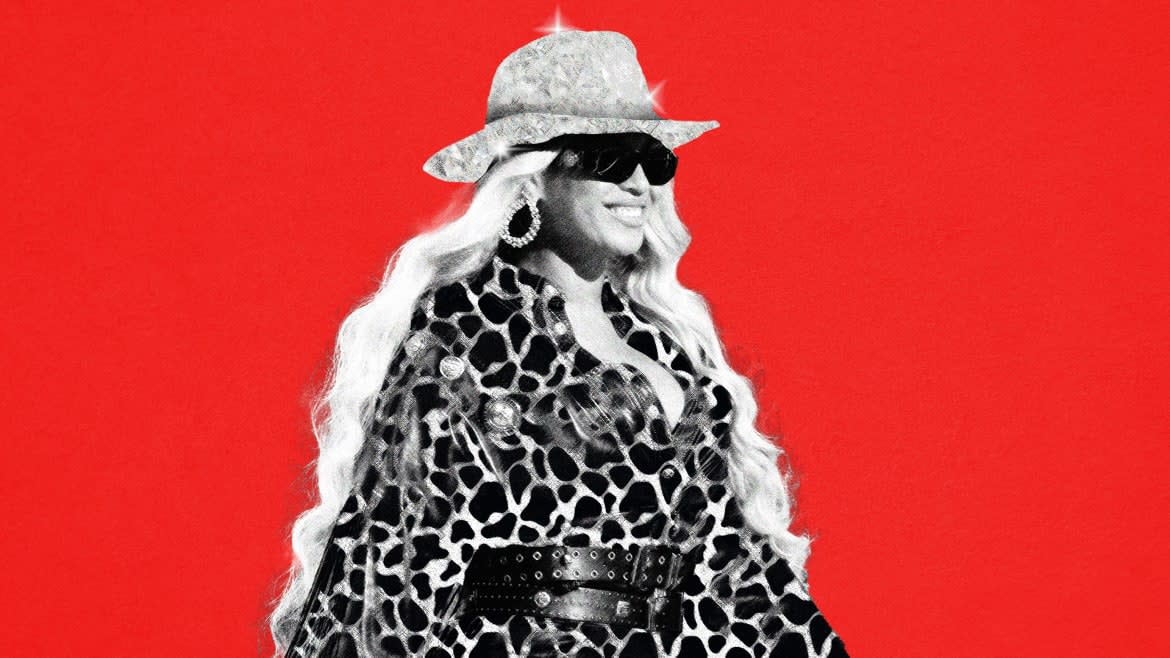In Defense of Beyoncé’s Transformative Dolly Parton Cover

- Oops!Something went wrong.Please try again later.
This isn’t your grandmother’s “Jolene.”
That much was clear when it was first rumored that Beyoncé would cover the iconic Dolly Parton song for her genre-defying album Cowboy Carter, which continues to break boundaries. Dolly P herself rallied for years to get Beyoncé to cover the track, so it’s no surprise her rendition was one of the most anticipated songs on an already buzzy album.
But fans are less than pleased with Bey’s take on the scorned-woman anthem—enough for some to claim she’s “ruined” the song by changing the lyrics and lending it a more threatening tone. Since its release last Friday, plenty of users have taken to X and TikTok to voice their disappointment with Beyoncé’s changes.
“I’m not sure that Jolene works when you take the pain out of it,” one user wrote. “If you’re not threatened by her, why are you plaintively singing her name repeatedly?”
But Beyoncé is threatened. It’s just that her response isn’t to plead with the other woman but to come out swinging. And beyond that, we don’t need another pleading cover of Jolene. The existence of Beyoncé’s version doesn’t erase the fact that we still have Parton’s. Beyoncé’s register is lower, her image is tougher, and her fiery take on “Jolene” is more in line with the image she’s created for herself.
Like other pop icons such as Taylor Swift and Ariana Grande, Beyoncé’s work is relentlessly picked apart for references to her personal life, such that any song released by Beyoncé the Artist is inevitably interpreted as a reflection of Beyoncé the Celebrity. By equating “Becky with the good hair” to Jolene “with flaming locks of auburn hair” in Dolly P’s charming intro, Bey encouraged that personal reading of her cover. So, if we already expect her to craft a “Jolene” along the same ragey lines that guided 2016’s “Sorry,” doesn’t it make more sense to change the lyrics to be more angry?
Jolene you better hide! pic.twitter.com/skXbhxHyGg
— 🦄 (@rolanbkl) April 3, 2024
Since Beyoncé first introduced the world to “Becky with the good hair,” it’s not really been her style to forlornly appeal to the other woman in the picture. Her first foray into country music, 2016’s “Daddy Lessons,” gave us a taste of what a gun-toting country “Cowboy Carter” with a hard edge would look like. “With his gun and his head held high, he told me not to cry,” Beyoncé sings in that track, “Oh, my daddy said ‘Shoot,’ my daddy said ‘Shoot.’”
Given the intense pushback Beyoncé received after performing “Daddy Lessons” at the 2017 Grammys, with country stans telling her there was no place for a Black woman like her in country music, there is an added dimension to consider when we evaluate the “Jolene” discourse.
I’m not convinced that racism is the sole cause for people who don’t like Beyoncé’s cover of “Jolene.” But you cannot deny that anti-Blackness plays a role in the reluctance to accept both Beyoncé’s cover and the album as a whole. Beyoncé has said that she intended Cowboy Carter to highlight the presence of Black artists long pushed out of country music and told there was no place for them there.
Another criticism of Bey’s lyric change is that instead of singing about how beautiful Jolene is, she chooses to sing about her family and herself. But in the context of the album, this change makes a lot more sense. Cowboy Carter pays homage to Beyoncé’s Louisiana, Alabama, Texas, and Creole roots. She has songs dedicated to her own children (“PROTECTOR”), her father (“DAUGHTER”) and her lineage (“16 CARRIAGES,” “YA YA”), so of course her version of “Jolene” centers on the strength of the family.
And if Beyoncé had sung the original “Jolene” lyrics, the meaning would be markedly different because Beyoncé is a Black woman. Parton’s Jolene was red-haired, with “ivory skin and eyes of emerald green.” It would be more than a little off-putting if Beyoncé had spent her verses extolling the beauty of a white woman who seduced her husband on an album that’s supposed to highlight Black artists in country.
A cover isn’t meant to be a carbon copy of the original. A cover by a star as big as Beyoncé on an album as innovative and ambitious as Cowboy Carter has to do more work than simply reciting what came before.
when my great aunt found out some woman took her man, she invited them both over, asked if they wanted lemonade, came back with a gun, shot him and told the lady “you can have him now” so i can’t be mad there’s a jolene anthem for women like her now
— ashley ray🍦ice cream money out 3/1 (@theashleyray) March 31, 2024
Though the memes and social media discourse tend to seize on the “embarrassing” aspects of defending a cheating man or allege that Beyoncé is being dishonest in her view of her relationship, her “Jolene” is packed with much more than a threat to a seducer. There is the exhaustion of experience, of a woman who has put in extra labor to keep her husband in line and whose family has already weathered the storm of infidelity. Her warning is a threat that masks a vulnerability.
It may be true that, as one fan put it, Beyoncé isn’t being honest about how much the infidelity hurt her. Unsatisfying as it is, that’s the reality for plenty of women who refuse to leave their men for offenses like cheating. That may not be the kind of conclusion to the scorned-woman drama we want to see. But it’s certainly on-brand for Beyoncé, who’s always been one to stand her ground.
Get the Daily Beast's biggest scoops and scandals delivered right to your inbox. Sign up now.
Stay informed and gain unlimited access to the Daily Beast's unmatched reporting. Subscribe now.

